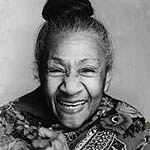Alberta Hunter
| Alberta Hunter | |
|---|---|

Hunter in 1979
|
|
| Background information | |
| Birth name | Alberta Hunter |
| Also known as |
May Alix Josephine Beatty |
| Born |
April 1, 1895 Memphis, Tennessee U.S. |
| Origin | Memphis, Tennessee, U.S. |
| Died | October 17, 1984 (aged 89) Roosevelt Island, New York, U.S. |
| Genres |
Jazz Blues |
| Occupation(s) | Singer songwriter |
| Instruments | Vocals |
| Years active | 1914–84 |
| Labels |
Black Swan Paramount Gennett OKeh Victor Columbia Decca Bluebird Bluesville |
| Associated acts |
Bessie Smith Ethel Waters Billie Holiday |
Alberta Hunter (April 1, 1895 – October 17, 1984) was an internationally known African-American jazz singer and songwriter who had a successful career from the early 1920s to the late 1950s (she was a contemporary of Ethel Waters and Bessie Smith) and then stopped performing. After 20 years of working as a nurse, in 1977 Hunter successfully resumed her popular singing career until her death.
Hunter was born in Memphis, Tennessee, to Laura Peterson, who worked as a maid in a Memphis brothel, and Charles Hunter, a Pullman porter. Hunter said she never knew her father. She attended Grant Elementary School, off Auction Street, which she called Auction School, in Memphis. She attended school until around age 15.
Hunter had a difficult childhood. Her father left when she was a child, and to support the family her mother worked as a servant in a brothel in Memphis, although she married again in 1906. Hunter was not happy with her new family and left for Chicago, Illinois, around the age of 11, in the hopes of becoming a paid singer; she had heard that it paid 10 dollars an hour. Instead of finding a job as a singer she had to earn money by working at a boardinghouse that paid six dollars a week as well as room and board. Hunter's mother left Memphis and moved in with her soon afterwards.
Hunter began her singing career in a bordello and soon moved to clubs that appealed to men, black and white alike. By 1914 she was receiving lessons from a prominent jazz pianist, Tony Jackson, who helped her to expand her repertoire and compose her own songs.
She was still in her early teens when she settled in Chicago. Part of her early career was spent singing at Dago Frank's, a whorehouse. She then sang at Hugh Hoskin's saloon, eventually singing in many Chicago bars.
One of her first notable experiences as an artist was at the Panama Club, a white-owned club with a white-only clientele that had a chain residing in Chicago, New York and other large cities. Hunter's first act was in an upstairs room, far from the main event; thus, she began developing as an artist in front of a cabaret crowd. "The crowd wouldn't stay downstairs. They'd go upstairs to hear us sing the blues. That's where I would stand and make up verses and sing as I go along." Many claim her appeal was based on her gift for improvising lyrics to satisfy the audience she was in front of. Her big break was when she got booked at Dreamland Cafe, singing with King Oliver and his band.
...
Wikipedia
